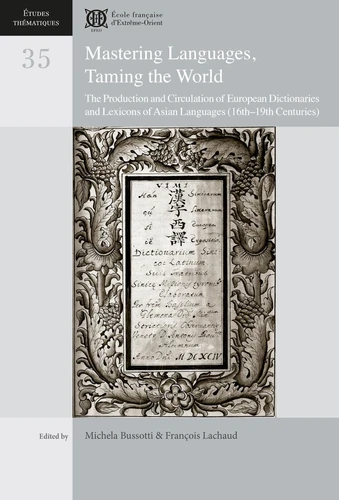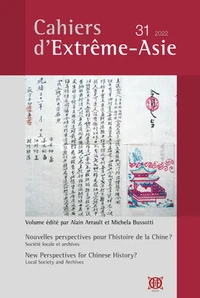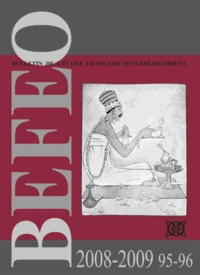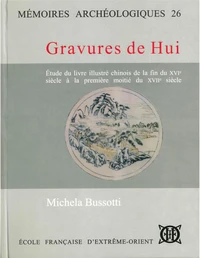Mastering Languages, Taming the World. The Production and Circulation of European Dictionaries and Lexicons of Asian Languages (16th-19th Centuries)
Par : ,Formats :
- Paiement en ligne :
- Livraison à domicile ou en point Mondial Relay indisponible
- Retrait Click and Collect en magasin gratuit
- Réservation en ligne avec paiement en magasin :
- Indisponible pour réserver et payer en magasin
- Nombre de pages504
- PrésentationBroché
- FormatGrand Format
- Poids1.51 kg
- Dimensions18,5 cm × 27,5 cm × 2,5 cm
- ISBN978-2-85539-273-8
- EAN9782855392738
- Date de parution09/10/2023
- CollectionEtudes thématiques
- ÉditeurEcole française Extrême-Orient
Résumé
Bilingual dictionaries and lexicons edited or compiled during the early modern and modern eras (1500-1900) offer invaluable historical insights into the dynamics of international interactions and encounters between Europeans and Asians, mostly in terms of cultural exchanges, but also in connection with variegated forms of diplomatic activities (both official and non-official), and even more with Catholic and, later, Protestant, missionary enterprises.
If they shed light on the advancement of linguistic knowledge and its dynamics, dictionaries are themselves the products of this knowledge, they are also the most precious tools for philologists and translators to ply their trade. This volume includes thirteen contributions from scholars with different backgrounds and methodologies to better emphasise the inexhaustible richness of these understudied materials, and to pave the way for future research perspectives on Asian word-hoards.
If they shed light on the advancement of linguistic knowledge and its dynamics, dictionaries are themselves the products of this knowledge, they are also the most precious tools for philologists and translators to ply their trade. This volume includes thirteen contributions from scholars with different backgrounds and methodologies to better emphasise the inexhaustible richness of these understudied materials, and to pave the way for future research perspectives on Asian word-hoards.
Bilingual dictionaries and lexicons edited or compiled during the early modern and modern eras (1500-1900) offer invaluable historical insights into the dynamics of international interactions and encounters between Europeans and Asians, mostly in terms of cultural exchanges, but also in connection with variegated forms of diplomatic activities (both official and non-official), and even more with Catholic and, later, Protestant, missionary enterprises.
If they shed light on the advancement of linguistic knowledge and its dynamics, dictionaries are themselves the products of this knowledge, they are also the most precious tools for philologists and translators to ply their trade. This volume includes thirteen contributions from scholars with different backgrounds and methodologies to better emphasise the inexhaustible richness of these understudied materials, and to pave the way for future research perspectives on Asian word-hoards.
If they shed light on the advancement of linguistic knowledge and its dynamics, dictionaries are themselves the products of this knowledge, they are also the most precious tools for philologists and translators to ply their trade. This volume includes thirteen contributions from scholars with different backgrounds and methodologies to better emphasise the inexhaustible richness of these understudied materials, and to pave the way for future research perspectives on Asian word-hoards.








